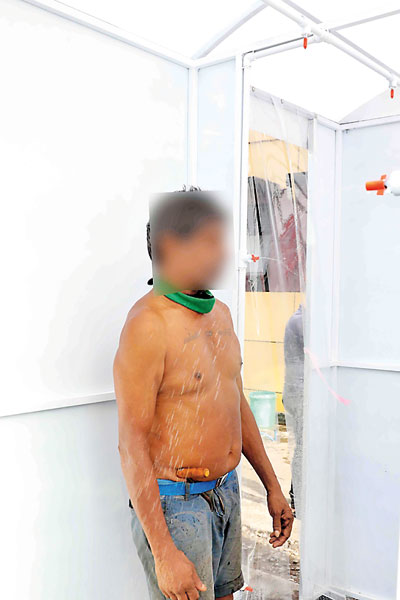News
Voice against use of ‘decontamination chambers’
View(s):Categorically the Sri Lanka College of Microbiologists has decried the use of ‘decontamination chambers’ as a measure to minimize the spread of COVID-19.
These chambers – installed in many places including the Health Ministry, with people being compelled to walk through them – use different kinds of spray including alcohol, chlorine compounds, ozonated water, soapy water and ultra-violet (UV) radiation.

Going through ‘decontamination’ at the vegetable market in Pettah
Referring to the views of the World Health Organization (WHO), the college states: “We strongly advise that spraying of individuals or groups is not recommended under any circumstances. Spraying an individual or group with chemical disinfectants or detergents is physically and psychologically harmful and does not limit the spread of COVID-19.”
The views of the college are:
- Even if a person is infected with the virus, spraying the external part of the body does not kill the virus inside the bodyand may worsen the clinical condition of the infected individual.
- For alcohol or other disinfectants to be effective, they need to be present in adequate amounts for a given period of time (contact time). The nature of these decontamination chambers does not sufficiently provide for this. According to the US Food and Drug Administration (FDA), for ozone to be effective in destroying harmful bacteria, it must be present at a concentration above levels considered safe for humans.
- There is a significant fire hazard.
- There is wastage of alcohol and other disinfectants in large quantities in these chambers, which can be used to prepare hand sanitizers and for environmental disinfection in healthcare and other high-risk environments.
- Spraying of chlorine on a person can cause eye and skin irritation, bronchospasms due to inhalation and potential gastrointestinal effects such as nausea and vomiting.
- Inhaled ozone can damage the lungs, may worsen chronic respiratory diseases like asthma and compromise the ability of the body to fight respiratory infections.
- Excessive exposure to UV light may put a user at risk of eye injury, skin burns or even an increased risk of skin cancer.
Meanwhile, referring to the practice of spraying disinfectants to large outdoor areas such as streets and public areas, the college states that such spraying or application should only be on surfaces that are highly or frequently touched by public such as hand railings, door knobs, poles on transit vehicles, elevator buttons, park/street benches etc.
Spraying of disinfectants in large quantities into the environment can cause environmental pollution, wastage of chemicals, harmful effects on humans and animals including fish, the college states, adding that the action of these disinfectants on these outdoor surfaces has yet not been evaluated since disinfectants may disintegrate or degrade with exposure to different environmental conditions such as sunlight. Therefore, rather than spraying large quantities of disinfectants on streets and public areas, frequently-touched surfaces should be wiped down with disinfectant solutions.

It is a spray-shower of ‘decontamination’ for all those lined up at Mirihana to board buses arranged by the government to head for home. Pix by M.A. Pushpa Kumara


